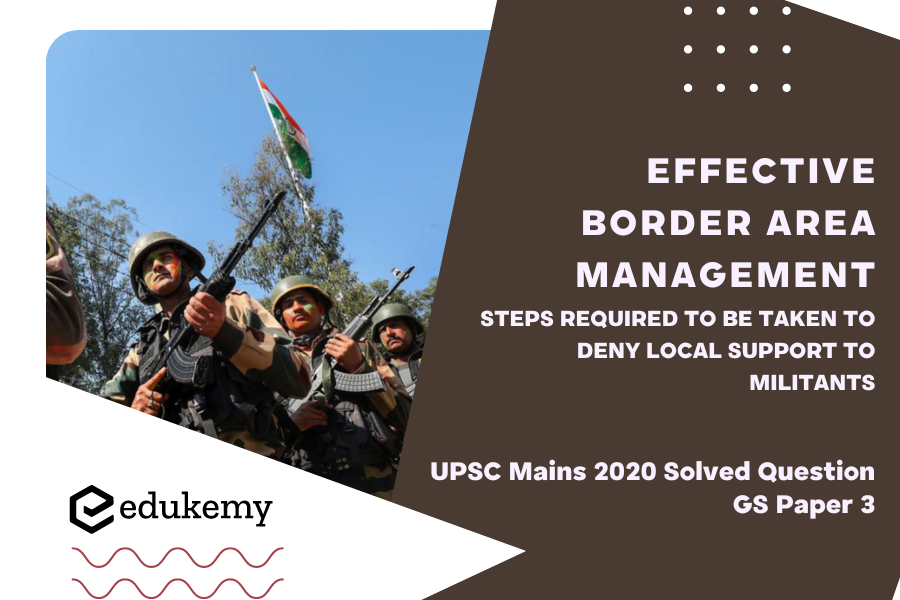Effective border area management plays a pivotal role in national security, necessitating a multifaceted approach to address the challenges posed by militants. To deny local support to insurgents, a comprehensive strategy must be employed, encompassing both security and socio-economic measures. This involves enhancing border surveillance, intelligence sharing, and collaboration between neighboring countries. Simultaneously, fostering positive relations with the local population is crucial to garner their support in countering militant activities. To achieve this, it is imperative to implement initiatives that address the root causes of discontent, such as socio-economic development programs and community engagement efforts. Striking a balance between robust security measures and community-building initiatives is essential for effective border area management that not only denies support to militants but also cultivates favorable perceptions among the local populace.
UPSC Mains General Studies Paper – 3 Mains 2020
Security challenges and their management in border areas, Role of external state and non-state actors, in creating challenges to internal security.
UPSC Mains Civil Services IAS Exam Question Paper – 2020
Decoding the Question
- In the Introduction, Write general facts concerning India’s International border.
- Body,
- Discuss steps required to be taken for effective border management and denying local support to militants.
- Suggest measures to create a favorable perception among locals.
- Try to conclude with the significance of community-based border management.
Answer
Introduction
India has 15,106.7 km. of land border and a coastline of 7,516.6 km. including island territories with neighboring countries. Thus, effective border management is important. Border management is a security function that calls for coordination to secure our frontiers and safeguard nations from the risks of unauthorized movement of goods and people across borders. Governments make a huge investment and provide good support for border security. Still, border management poses major challenges around the world.
The border population has many other disadvantages as:
- Vulnerability to actions of border criminals.
- Restriction/control over movement by forces.
- Fear of the unknown—threat of aggression by the enemy, cross-border shelling, firing, etc.
- Lack of industrialization/economic progress, neglect by Government being frontier areas.
- Lack of infrastructure, means of communication, education, medical, water, and remoteness.
There is an immediate need to reduce such vulnerabilities to ensure their participation in effective management.
Steps need to be taken
- Employment opportunities: Provide employment opportunities to the youth so that they can do away with the militancy and therefore instead of supporting the militants, they will oppose them.
- The policy of Carrot and Stick: Incentivising local youths who joined militant organizations by supporting them to join mainstream society, de-radicalization approach, psychological treatment, giving them a sense of equal stakeholders in nation-building, etc. will help to counter extremism and at the same time, the neutralizing policy of security forces should be run in parallel.
- Grassroots Democracy: Conducting local body elections in re-establishing the grassroots level democracy which results in extended support from the community in development processes.
- People’s Participation in Developmental Activities: People’s participation is crucial for the success of any developmental activities, therefore, increasing people’s participation and making them key stakeholders in the development of the state, region, and ultimately nation.
- Reduce Trust Deficit: Media is very crucial in reducing the trust deficit of local people especially youth and responsible media can be very effective in making local people aware of the negative aspects of militant activities and supporting these activities.
- Media Facilitation Centers: Setting up of Media Facilitation centers to reduce the trust deficit since these centers provide internet services to reporters and freelancers.
- Intelligence Grid: Strengthening the technical intelligence grid to track any terror suspect and prevent terrorist attacks with real-time data. It will also enhance human intelligence networking.
- Eradicating Transborder Terrorism: It is one of the biggest problems facing the Kashmir region. To counter this, there is a need to improve border fencing in inaccessible areas electronic sensors, cameras, and various technologies should be used to keep the surveillance to check cross-border infiltration.
- Integrating Regions by Breaking Psychological Barriers: Integrating regions while keeping regional identity, will create the acceptance of the culture and identity of the people of one region in another region which ultimately helps in removing psychological barriers.

Way Forward
- Without the development process, there will be no organic end to the causes of discontent and unrest.
- Social empowerment by means of skills, education, employment opportunities, human rights, rule of law has enough potential to tackle the unfavorable perception among the locals.
- Also, controlling the misinterpretation of culture, hate speeches and ignorance will enhance the process of persuasion and cognitive change.
Conclusion
Thus, Border Management is not just fencing our borders but also engaging local people in the security and prosperity of border regions. To transform border areas as frontiers of development, it is necessary to work on the capacity building of local people through active involvement in the social, economic, and political process.
Frequently Asked Questions (FAQs)
1. How can effective border area management deny local support to militants?
A: To deny local support to militants in border areas, a multifaceted approach is essential:
- Enhanced Surveillance and Intelligence Sharing:
- Strengthen border surveillance through advanced technology such as drones, sensors, and satellite imagery.
- Establish effective intelligence-sharing mechanisms between local law enforcement, military, and intelligence agencies.
- Community Engagement Programs:
- Develop community policing initiatives to build trust between security forces and local communities.
- Implement awareness campaigns to educate locals about the negative impacts of supporting militants, emphasizing the importance of peace and stability.
- Economic Development:
- Invest in socio-economic development projects in border regions to create employment opportunities and improve living standards.
- Foster entrepreneurship through skill development programs, reducing the appeal of joining militant groups.
- Strict Border Controls and Checkpoints:
- Implement rigorous border controls to curb the movement of militants and illicit activities.
- Introduce smart technologies for efficient border checks to minimize inconvenience to local populations.
- Community-Based Intelligence Networks:
- Establish community-based intelligence networks to encourage locals to share information about militant activities discreetly.
- Provide incentives for information leading to the arrest or neutralization of militants.
2. What measures can be taken to manage favorable perceptions among locals in border areas?
- Cultural Sensitivity:
- Train security forces in cultural sensitivity to avoid unintentional offenses and build positive relationships with local communities.
- Incorporate cultural awareness programs into security personnel training.
- Infrastructure Development:
- Invest in infrastructure projects such as schools, hospitals, and roads to improve the overall quality of life in border regions.
- Ensure equitable distribution of resources to prevent any perception of discrimination.
- Responsive Governance:
- Establish transparent and accountable governance structures in border areas.
- Encourage local participation in decision-making processes to address community concerns and needs.
- Community Outreach and Dialogue:
- Conduct regular town hall meetings and open forums for community members to express their concerns and grievances.
- Foster open communication channels between local leaders, government officials, and security forces.
- Humanitarian Assistance:
- Provide timely and effective humanitarian aid in times of crisis or natural disasters to demonstrate government commitment to the well-being of the local population.
- Collaborate with NGOs and international organizations to ensure comprehensive support.
- Media and Information Campaigns:
- Use media platforms to highlight positive stories and initiatives in border areas.
- Counter misinformation and propaganda by ensuring accurate and positive narratives about government efforts.

For UPSC Prelims Resources, Click here
For Daily Updates and Study Material:
Join our Telegram Channel – Edukemy for IAS
- 1. Learn through Videos – here
- 2. Be Exam Ready by Practicing Daily MCQs – here
- 3. Daily Newsletter – Get all your Current Affairs Covered – here
- 4. Mains Answer Writing Practice – here
Visit our YouTube Channel – here


